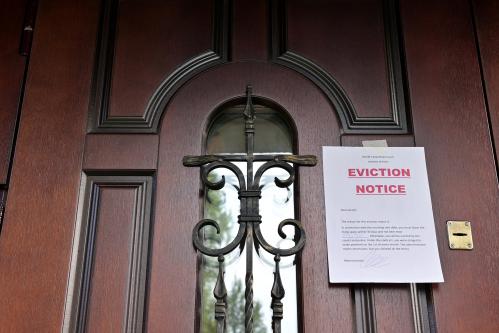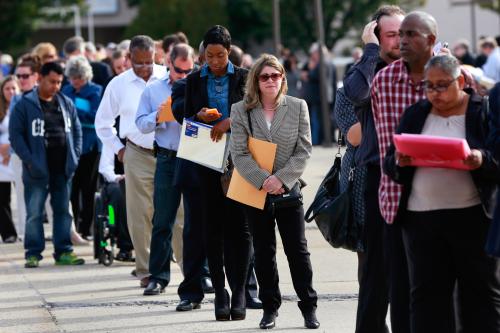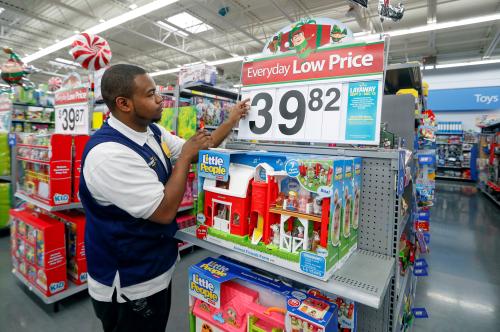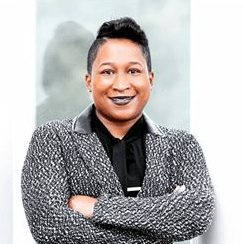Last month, the Supreme Court rejected the Biden administration’s attempt to extend the nationwide moratorium on evictions during the COVID-19 pandemic. In Alabama Association of Realtors v. Department of Health and Human Services, the court ruled that the Centers for Disease Control and Prevention’s (CDC) eviction moratorium exceeded the agency’s authority. As a result, evictions have restarted, with evicted parents being separated from their children while entire communities are likely to see increased COVID-19 diagnoses.
This decision exemplifies the long pattern of American jurisprudential interventions that ignore Black suffering. While the contemporary understanding of the federal judiciary is shaped by recent liberal social wins in the Warren Court and LGBT rights cases during the Roberts Court, the judiciary is—by definition—the most thoroughly undemocratic branch of government, and has long been a locus of reactionary and illiberal decisionmaking. For this reason, many have argued that, even when the courts do allow substantive social change, reformers’ efforts are better spent pushing legislative action. From Dred Scott v. Sandford (1856), Plessy v. Ferguson (1896), and Korematsu v. United States (1944) all the way to Shelby County v. Holder (2013), the judicial system has maintained, justified, and reified white supremacist, classist violence. And the era of liberal social wins seems to be waning, with the Supreme Court’s recent functional overturning of Roe v. Wade.
One example of how the Supreme Court’s historical jurisprudence continues to shape the lived reality of Black Americans is the decision in 2013’s Shelby County v. Holder. This landmark ruling struck down key parts of 1965’s Voting Rights Act, which aimed to overcome legal barriers at the state and local levels that prevented Black people from being able to exercise their right to vote as guaranteed by the 15th Amendment. Because Congress had determined that entrenched racial discrimination in voting was more prevalent in some jurisdictions, Section 5 of the Voting Rights Act required certain state and political subdivisions to clear changes in election procedures with the U.S. attorney general or the U.S. District Court for the District of Columbia prior to enactment—a process known as “preclearance.”
On June 25, 2013, in a 5-4 decision, the Supreme Court struck down the preclearance condition, ruling that it exceeded Congress’ power to enforce the 14th and 15th Amendments. “The conditions that originally justified these measures no longer characterize voting in the covered jurisdictions,” Chief Justice John Roberts wrote for the majority. In the dissent, Justice Ruth Bader Ginsburg wrote that “voting discrimination still exists; no one doubts that. But the Court today terminates the remedy that proved to be best suited to block that discrimination.”
The 2016 presidential election was the first in 50 years without the full protection of the Voting Rights Act, and some states have used this opportunity to pass increasingly restrictive laws to suppress the Black vote. There are fewer voting rights today than there were when the Civil Rights Act and Voting Rights Act were passed.
In the Supreme Court’s latest decision that will disproportionally hurt Black Americans, the justices heard arguments from Alabama landlords who had previously petitioned to lift the CDC’s eviction moratorium and were denied. They returned to federal court in early August, requesting an order that would allow evictions to resume. Led by the Alabama Association of Realtors, they argued that the CDC exceeded its authority when it instituted an eviction moratorium to assist renters during the pandemic. This time, the court agreed—deciding against tenants’ rights to protection from the COVID-19 pandemic, and in favor of landlords’ profit.
Last month, Brookings Metro wrote about the state of evictions before the pandemic and what the end of the eviction moratorium would mean for Black-majority neighborhoods. Black-majority neighborhoods see higher eviction rates relative to neighborhoods where less than 1% of the population is Black—even where poverty rates are low, education rates are high, and renters’ cost burden is small.
One of the objectives of the CDC’s initial eviction moratorium was to mitigate the spread of COVID-19 within crowded, congregate living settings by allowing people to remain in their homes. Aside from the epidemiological effects, evictions are associated with psychological trauma and increased likelihood of suicide, particularly for children. Evictions also increase emergency room usage and decrease positive health outcomes. During the COVID-19 pandemic, these problems have only grown more acute. As the Delta variant continues to ravage American communities, metropolitan leaders are facing crisis-level hospital staff and space shortages.
Another one of the CDC’s objectives was to allow “additional time for rent relief to reach renters.” The CDC believed that, because the vast majority of rent relief had yet to reach renters, by giving states time to allocate federal relief, renters and communities could be spared the negative health consequences of evictions during the pandemic. But rent relief still has not been widely disbursed.
In July, President Joe Biden announced that his administration would allow the initial eviction moratorium to expire. But under intense congressional pressure led by first-term representative Cori Bush (D-Mo.), the CDC issued a new eviction moratorium on August 3. That extension was what the Supreme Court struck down.
There should be nothing surprising about the Supreme Court’s decision to ignore the suffering of Black tenants. In the 2020 presidential election, Black voters were told that their participation would be key to protecting democracy. They went through extraordinary effort to do so: waiting in line for hours to vote, being purged from voter rolls, acquiring the newly necessary voter IDs, getting witnesses for absentee ballots, and dodging election day misinformation. The court’s decision in Shelby County v. Holder has made existing within our democracy particularly hard for Black people—and now, in their decision against the CDC, the court has made existing in their homes particularly hard for Black people.
The Democratic Party should not assume that Black voters will continue to show up for them without new voting rights protections or substantive, material improvements in their lived realities and communities. Black voters did their part in electing Democrats; now, Democrats must protect the Black community from the court’s actions to take away their voting rights and their homes.
Taking Black voters for granted is nothing new in American politics. That is why we have said that protesting is just as important as voting. Rep. Bush’s valiant organizing effort to extend the eviction moratorium showed that it was not votes on the House floor that changed the Biden administration’s mind, but direct action instead. Voters, too, have more power in their direct action than they do at the ballot box; rent strikes, labor strikes, and civil disobedience are all forms of protest that have the capacity to empower Black people.
Black communities have seen the efforts of the civil rights era, the Voting Rights Act, and the fight for abortion rights decimated. These communities have been further devastated by COVID-19, and, without action, will be hit particularly hard by the coming eviction crisis. Without federal action, local policymakers will be responsible for protecting tenants. Here, Philadelphia can serve as a model; the city’s landlords and tenants must go through a mediation process and apply for emergency rent relief before landlords can file for eviction. This ensures a more equitable voice for tenants, whose concerns are often disregarded.
At a time when the Supreme Court is hampering the potential for federal action, metropolitan leaders must step up to protect tenants, and tenants must demand action from those leaders through the vote and—when necessary—direct action.
The Brookings Institution is committed to quality, independence, and impact.
We are supported by a diverse array of funders. In line with our values and policies, each Brookings publication represents the sole views of its author(s).








Commentary
In overturning the eviction moratorium, the Supreme Court continues its history of harming Black households
September 14, 2021